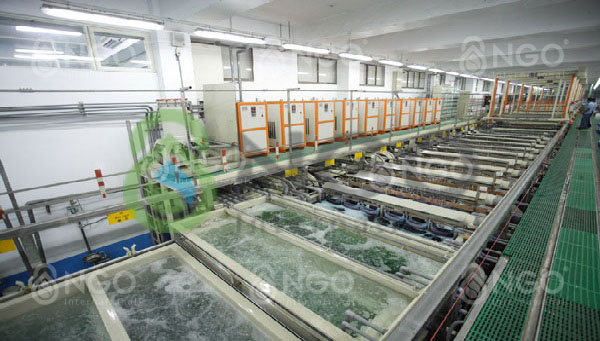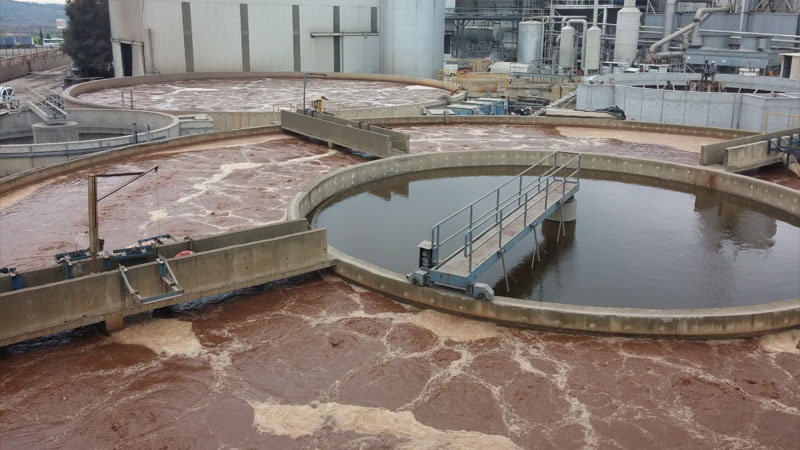
The electroplating industry is one of the important manufacturing sectors but simultaneously generates wastewater containing numerous hazardous substances. If not properly treated, wastewater from the electroplating process can lead to serious consequences for both the environment and human health.
1. Hazardous Components in Electroplating Wastewater
Electroplating wastewater contains various harmful substances and heavy metals, including:
- Heavy metals: Such as Chromium (Cr), Nickel (Ni), Zinc (Zn), Cadmium (Cd), Copper (Cu), Lead (Pb). These metals can persist in the environment for a long time, causing pollution and impacting ecosystems.
- Acids and Bases: Electroplating wastewater often has unstable pH levels and contains strong acids such as sulfuric acid and nitric acid, which can corrode and alter the natural environment.
- Organic solvents: Cleaning agents and solvents used in the surface treatment of metals also remain in the wastewater, potentially polluting water and air.
2. Environmental Impacts of Electroplating Wastewater
If not properly treated, electroplating wastewater can cause several serious environmental issues:
- Water pollution: Heavy metals in wastewater can contaminate surface water and drinking water sources, making water toxic and unsuitable for consumption and industrial use.
- Soil degradation: When heavy metals from wastewater seep into the soil, they accumulate and reduce the soil’s productivity, affecting soil ecosystems and plant life.
- Destruction of aquatic ecosystems: Heavy metals and other toxic substances can lead to mass die-offs of fish and other aquatic organisms, causing severe degradation of aquatic ecosystems.
3. Impacts on Human Health
Electroplating wastewater not only affects the environment but also poses dangerous risks to human health, especially when harmful substances enter the food chain or drinking water sources:
- Heavy metal poisoning: Exposure to electroplating wastewater containing heavy metals can lead to poisoning, resulting in liver damage, kidney failure, nerve disorders, and even cancer.
- Skin and respiratory diseases: Direct contact with wastewater or inhaling chemical vapors from heavy metals and acids can cause dermatitis, skin irritation, and respiratory diseases.
- Accumulation of toxins in the body: Heavy metals such as lead and cadmium can accumulate in the human body through the consumption of contaminated food or water, causing chronic diseases and serious damage to internal organs.
4. Responsibilities of Enterprises in Electroplating Wastewater Treatment
Due to the hazardous nature of electroplating wastewater, businesses must implement treatment solutions to minimize negative impacts on the environment and human health:
- Invest in wastewater treatment systems: Advanced wastewater treatment systems should be installed to remove heavy metals and toxic substances before discharging into the environment.
- Comply with legal regulations: Enterprises must ensure compliance with discharge standards and environmental laws to avoid fines and protect public health.
If you are interested in electroplating wastewater treatment solutions, please refer to the article: Electroplating Wastewater Treatment Solutions.

The technology for electroplating wastewater treatment.
5. Benefits of Proper Electroplating Wastewater Treatment
Effective electroplating wastewater treatment not only helps reduce negative environmental impacts but also brings tangible benefits to businesses, such as:
- Minimizing legal penalties: Compliance with environmental regulations helps businesses avoid fines for violating discharge rules.
- Protecting reputation and brand: Businesses that fulfill their social responsibility will earn trust from customers and the community.
- Improving production efficiency: Proper management of electroplating wastewater improves production efficiency and reduces negative impacts on employee health.
Conclusion
Electroplating wastewater contains many hazardous substances that can cause environmental pollution and health risks to humans. Therefore, businesses need to adopt modern electroplating wastewater treatment solutions and comply with legal regulations to protect the environment and maintain sustainable development.

 Tiếng Việt
Tiếng Việt





